
We are told somehow, somewhere, someway humans found a magical alien crystalline energy source in outer space and it transformed human society. We are told some alien Big Bads decided they wanted it and started attacking the earth. We are told about major cities being devastated world wide. We are told about loving longings between characters. We are told about friendships between characters. Another important thing this movie forgot---showing is more important than telling.
I found it utterly impossible to emotionally connect with any of the characters. Shu Qi is a beautiful and talented actress who was given the job of standing around looking at a monitor and giving orders. The four young pilots featured didn't have enough charisma or meaningful interactions with each other to have me invested in their lives or even remember who they were half the time. The rest of the cast acted in such a reserved manner as to feel almost lifeless.
Much of the CGI was good, even if the part of the alien spaceship they showed looked suspiciously like the ship from Independence Day. Too bad they forgot the part where we were shown what the actual aliens looked like from that movie, to make the battles seem even more personal and real. In Shanghai Fortress with all the amazing weaponry the humans had developed to combat the aliens, I'm at a complete loss why they still fought the alien robots on the ground using ineffective bullet shooting guns. There were several plot developments that made no sense.
Sometimes I can check my brain at the door and just enjoy the ride if the characters are compelling enough but this felt more like a hologram that was all visual with no substance.
Esta resenha foi útil para você?
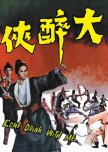
The characters were well rounded and even the supporting cast had weight and depth to them. The main leads had proper character development, unlike many cardboard cut-out characters from other martial arts movies.
Cheng Pei Pei was only 19-years-old and already she showed she could carry a movie. Though she lacked in fighting experience her grace and steely gaze made her character someone to be reckoned with when she drew her blades. A truly strong female lead who faced danger head on and dispatched her enemies on her terms. Yueh Hua was convincing as the Drunken Cat and leader of the beggar children who always showed up when needed and fought without fighting for the most part.
If I had one complaint, it was the number of musical scenes. I had to keep in mind that the songs were a subterfuge and means of passing along messages which would have made more sense to me the first time it happened if the copy I watched had subtitles for the songs.
The fight scenes were crude compared to later movie sword-fights but this was cutting edge at the time. Pei Pei's fight scenes were often stylized and dance-like, maybe not realistic but beautiful. Camera angles enhancing the actors' movements as well as attachment for the characters' well-being kept the fights interesting and also moved the story along. The story was well-written and was surprisingly well-layered.
The cinematography, sets, and costumes were definitely a notch above many of the wuxia movies from the time and even those that followed.
Come Drink with Me is an entertaining and well made movie, a worthy grandmother to Crouching Tiger, Hidden Dragon and other movies which benefited from it's storytelling.
Esta resenha foi útil para você?

Most of the cast does a decent job of acting. The female lead gave it her all throughout the film and committed herself to the role. There were others who seemed to be reading their lines.
The biggest problem was with the production values. The first 10-15 minutes weren't bad. The cinematography and fights were okay. Then the quality plummeted. Some of the costumes and wigs were downright awful. The evil Japanese couple seeking to steal the list of corrupted officials from the swordswoman and the man she was protecting had wigs that looked like they came out of a bad comic strip. They tried speaking Japanese at one point and then gave up and went back to Mandarin. The evil eunuchs laid it on thick with the high pitched voices to the point it sounded like they'd breathed in helium before some scenes began. I rarely notice music unless it's really bad or really good. I noticed the music in this movie and it wasn't really good.
The movie played out like a wuxia sketch show complete with errors that no one bothered to correct. At one point an unconscious character lying in the road rolled away to avoid being hit by a carriage and then went back to being prone. The sword fights were slow, very slow and badly choreographed. Quite honestly, I laughed out loud several times during the movie at scenes that were not supposed to be funny.
Despite all the errors and bad fight choreography, there was an interesting story hidden beneath the rough appearance. The movie played out in earnest with many heroes and bad guys falling. Normally, I would have scored a modern movie of this quality lower, but because a swordswoman was prominently featured I gave it a little bump because a woman with a sword is my weakness. Unless you are looking to watch a very low budget wuxia you might want to give this one a pass.
Esta resenha foi útil para você?

Once again, aliens are looking to take over the earth using monsters to help them defeat Godzilla and the puny humans. In this movie they summon King Ghidorah and Gigan, two formidable enemies. Their base is a children's theme park with a Godzilla tower supposedly to promote peace but like Nick Fury said in The Avengers, we know they mean the other thing. The humans working against them are an oddball bunch including a clutzy, inept manga artist, his black belt girlfriend, a weird hippie guy and a scientist and his sister.
The funniest and most surreal bit in the movie is when the good guys get hold of one of the alien computer tapes and play it. They can't figure out what it means but Godzilla and Angilas hear it on Monster Island. Using cartoon bubbles, Godzilla asks Angilas to go check it out and they have a short "conversation". It happens again later in the movie as well. Weird even for a Godzilla movie.
After KG and Gigan stomp through Tokyo, Big G and Angilas enter a tag team match with them. The movie intertwines clips from earlier movies and they don't always mesh very well. I'm all for the monster grappling matches but this had to be one of the longest ones in Godzilla history and honestly, was a little boring. Angilas was pretty useless as a partner and Godzilla spent most of his time on the ground and seemed to forget he had that destructive atomic breath. Godzilla's design and size also didn't seem formidable reflecting how ineffective he was for much of the movie.
Godzilla vs Gigan had it's entertaining moments, too bad they came few and far between.
Esta resenha foi útil para você?
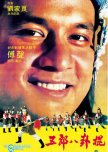
Famously known as the film Alexander Fu Sheng died while filming, in a car accident off set. The script had to be re-worked leaving him out of the final fight scenes.
The themes of loyalty, family, honor and betrayal are woven throughout the movie. Out of seven sons, only two survived a betrayal by a family friend and ambush. One was driven mad and the other hid in a Buddhist temple and refined his pole fighting skills. The mood is bleak and dark throughout the film as the surviving family members seek justice and revenge.
I look forward to movies directed and choreographed by Lau Kar Leung. His fights are always fast and creative. Brutal, too. Gordon Liu is a gifted fighter and with every film of his I see I am more and more impressed. The pole sparring session between Liu and Phillip Ko Fei is not to be missed. Not to be outdone, Kara Hui shines as the sister who has to fight through her own ambushes and entrapment on her way to find her brother. The final fight is a bit gruesome as the monks practice their non-lethal moves that extract an opponent’s teeth. The action is almost non-stop from the opening credits to the end.
The story didn’t move me as much as I hoped it would. The fight scenes were, however, spectacular and worth watching this movie for.
Esta resenha foi útil para você?

Godzilla, Mothra, & King Ghidorah: Giant Monsters All-Out Attack
2 pessoas acharam esta resenha útil
Once again we have a plucky female heroine, this time the intrepid reporter, Yuri. More often than not she ended up playing the damsel in distress in need of rescuing no matter how brave and spunky the writers intended her to be. Alongside the guardians, the humans led by Yuri's father, have also developed a weapon they hope will put an end to Godzilla's reign of destruction.
Instead of random, almost unseen people getting killed, Godzilla's victims are often shown close up or are characters who have been introduced. There are real stakes with the humans' and guardians' lives. Godzilla has returned to being the terror that he was in 1954. The monster fights are actually quite good and entertaining as each Guardian does their best to take down Godzilla. Once the action starts around thirty minutes into the movie, it never lets up. Overall, this was an entertaining kaiju movie.
Esta resenha foi útil para você?

Her mother wants her to find a husband who lives in the valley where they are able to get two harvests a year and attain slightly greater wealth and stability than the one harvest they are limited to in the mountains. A Qiu desires so much more for her life and studies hard to be eligible for a quality secondary school. She knows that education is the opportunity for a life not tied to the rice paddies. Unfortunately, that education costs more than the little family has to spare.
Without being overly dramatic the film shows how precarious life and dreams are when the cost of education can be too high when measured by grains of rice.
I enjoyed this film largely because of the family unit who worked together and looked after each other. The score and loving shots of the characters and land wove together with the narrative to make a compelling, spare film about life, family, and dreams.
Esta resenha foi útil para você?

I enjoyed this movie, it's one of the last Mothra movies to be aimed at adults as well as children. Later, the movies became obviously aimed at kids.
The miniatures were good and Godzilla was given a menacing face to make sure you knew he was the bad guy in this tale. I did worry a little for the actor inside when it looked like his costume caught on fire!
Mothra was at the end of her life cycle and her appearance showed it. Though ragged around the edges she was still her graceful, mystical, environmentally conscious self even if she was not at the top of her game.
The twin Shobijin fairies were once again played by the Peanuts, singers from the 1960's. Mothra's besties always know when to call on her for help and when to encourage her.
There was a rather lengthy subplot about greedy investors wanting to use Mothra's egg that washed up during a typhoon as a tourist attraction, but we all know the main attraction was watching the two leads fight! The fights were short but effective and a reminder to never underestimate a Butterfly.
These movies were made before CGI and you have to let your mind travel back into a simpler movie time to enjoy it. But enjoy it I did.
Esta resenha foi útil para você?
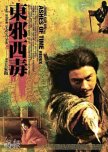
There are times this film tries too hard to be "artistic" and other times it succeeds. The fight scenes are blurry using a slide-show technique I wasn't overly fond of because it was nearly impossible to tell what was going on. Other times the grainy colorization worked and was beautiful.
Most of the characters are dealing with the consequences of the bad choices they've made or the problems created by inaction. Only one character seems to overcome this dilemma by making choices that guide him away from being simply a cold-blooded killer and able to love as well.
Yo Yo Ma does a great job of re-imagining Frankie Chan's original score from the 1994 movie. The music enhanced the scenes and the emotions being played out.
This film can be confusing as the characters' faces are often half-hidden and the story doesn't always play out in chronological order, making heavy use of flashbacks. I honestly need to watch it again to make better sense of the story.
Ashes of Time is often thrown into the love it or revile it category because of it's different artistic take on the classic wuxia tales. If you enjoy wuxias it's worth a try, you might be pleasantly surprised.
Esta resenha foi útil para você?

Lo Lieh isn't dressed in black as usual but a fashion conscious lord of some sort. Fast swordsman but not exactly the sharpest blade in the drawer. Ti Lung is fast and smart. Good thing because they have to fight for their lives against greater forces from beginning to end. Few people are who they seem to be and betrayals abound. As do plot holes. It seems like everyone is an assassin in disguise-an old woman, children, women, men, a man with a woman's voice. Hidden underneath the blood and subterfuge is a sad morality tale about power and money. The sets and costumes are top-notch for a kung fu film. It's one of those fun, forgettable kung fu flicks that makes for an entertaining 90 minutes if you don't ask too much from it.
Esta resenha foi útil para você?

Esta resenha pode conter spoilers
If you are able to embrace the absurdness of a hero who is trained first by a girl and then a pot-bellied condor, you might just enjoy this movie. Leslie Cheung is beautiful and vulnerable in this role of a young man who is the son of a traitor and must overcome trials and tribulations to find his way in the world.I might have enjoyed it more if I was familiar with the source material, Jing Yong's "Return of the Condor Heroes". As it was I could tell that there were characters I should know and story lines left dangling at the end. Even though it seemed there was way too much story to tell in 90 minutes it was an entertaining and intentionally or unintentionally hilarious movie at times. Not to say there wasn't darkness woven through the tale as well. Sexual assault, buckets of blood, people and animals cleaved in half, and someone made a meal out of a family pet.
Cheung as Yang Guo and Yung Jing Jing as the titular Dragon Maiden, had good chemistry together as she taught him to fight and as they fell in love. Lo Lieh shows up briefly as a seemingly crazy kung fu master completely immersed in the Toad style of fighting. Chen Kuan Tai plays the uncle who tries initially to set the young hero on the path of righteousness but ends up unknowingly putting Guo in a sect bent on revenge for the father's actions.
The story rarely slows down with either fighting or training scenes containing lots of wire action and creative weaponry in most scenes. The Big Bad and his minions create havoc as well as other rivals for the Dragon Maiden's affection and Guo gets plenty of practice taking a beating and learning his way through the martial world.
For a 1980's kung fu movie it lived up to expectations and the production values were much higher than most of the 1970's kung fu movies I've seen. Even if the condor looked like a reject from H.R. Pufnstuf.
Esta resenha foi útil para você?
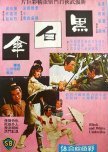
Esta resenha pode conter spoilers
Mary Poppins Kung Fu Fight with a Vengeance!
Black and White Umbrellas is about two rival clans who have had deep enmity between them for years. The premise is pretty simply, one clan dresses in white and carries white umbrellas, the other wears black and carries black umbrellas.Basic story elements follow-do not read if you are super spoiler sensitive--I like to know a little about the story of these movies before I commit to watching one, thus the sharing of these elements---
After a climatic and deadly battle between the leaders of the clans, peace held for many years until the son of one of the leaders returned for a bloody vengeance. Killing, raping, and dis-arming people until he took over the local fort, there wasn’t much evil he wouldn’t do and he did it all with great glee.
In walks the pacifist hero who had been given instructions by his dying father to stop the hatred and killing. This does not work out well when dealing with a homicidal maniac and the hero ended up at the bottom of a cliff badly wounded. Two women passing by carried him off to safety (apparently women were much stronger in days of yore), while a Mysterious Woman in White showed up to tend to him. The story at this point is largely hers. She spies on the Black Umbrella Man and his minions, fights with them and gives the White Umbrella Man time to heal.
Eventually, White Umbrella Man heals, decides Black Umbrella Man has to go no matter what dear old departed daddy ordered and he and the Mysterious Woman in White work together.
When watching these old kung fu movies I grade on a different scale. They were shot on the cheap for a specific audience 40-60 years ago. This movie had been cut and re-cut to fit different formats and the subtitles were often cut off at both ends.
The Mysterious Woman in White is expressive and handles her fights well, as does the The Black Umbrella Man. The White Umbrella man's acting is a little stiff though his fighting skills make up for it.
There must be a Buckets of Blood service that supplies these movies and Umbrellas went through it's share. The affinity for shooting in dark places escapes me, fortunately, the FL's fights were often in the light. Taiwanese kung fu movies are usually less well made than the Hong Kong Shaw Brothers made movies, but the Taiwanese movies do often shoot in beautiful outdoor settings. Umbrellas used a waterfall, forest, cave inn (please let that be the name of the place) and mountains as settings for fights and nefarious doings. And of course, the ubiquitous gravel quarry so that the trampoline and wire work can be done, which was fun, especially with the weapons loaded umbrellas scenes.
Umbrellas takes advantage of all sorts of creative weapons and plenty of fights to showcase them. This movie is saved for me because the FL gets a lot of sword time and doesn't back down from a fight even when she's outnumbered.
Not a movie for everyone, only those who get a kick out of old kung fu movies.
Esta resenha foi útil para você?

Esta resenha pode conter spoilers
Cynthia and Itami are young lovers in the pre-Sino Japanese war time in Shanghai. Itami is called home to Japan for military service, leaving Cynthia behind in her homeland. After Cynthia's brother is killed by a pro-Japanese protestor she joins the Purple Butterfly resistance movement. As time passes she is again reunited with Itami, but this time they are on opposite sides. She is assigned to help kill his boss. He is hunting down the Purple Butterfly members.This movie utilizes tight shots often through blue lenses. More often than not the scenes are smoky or rainy, shot with a shaky hand. There is a scarcity of dialogue. The scenes will either feel intimate or claustrophobic, and sometimes they can feel both. Purple Butterfly can be maddeningly hard to follow at times as the story bounces back and forth in time and between characters, but buried under the pretty wrapping are solid performances by Zhang Ziyi, Nakamura Toru, and Feng Yuan Zheng. The sadness and inevitability of the war to come lingers over the story like the smoke and rain enveloping each scene.
Esta resenha foi útil para você?

Esta resenha pode conter spoilers
This one hour entry in the HBO Asia Folklore anthology was gripping. A family’s story and murderous secrets erupt when a son returns home for his father’s funeral. Kitamura Kazuki gives a stellar performance as a deaf crime scene writer. He conveys a myriad of emotions without ever saying a word as his character is forced to finally confront the horror hidden in his past and the horror facing him in the present. Kanno Misuzu plays the mother who becomes unhinged as those memories arise. The third main character in this episode is the tatami mat in a deserted room that has secrets to reveal, memories to revive and vengeance to repay.
“Tatami” was the most polished of the anthology episodes I’ve watched. Far from perfect but definitely worth watching Kitamura and Kanno play off of each other. The story is tight using every minute to develop the characters and tell the story in the present and through flashbacks. The scariest elements to this story are not ghosts or the supernatural but the human greed and depravity buried within the layers of the tatami mat.
Esta resenha foi útil para você?
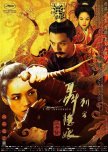
Esta resenha pode conter spoilers
The Assassin breaks out of the standard martial arts mold. If you are looking for a fast paced, bloody, high flying wuxia film, this is not that film. Every shot is a breathtaking painting, lovingly lingered over to give you time to sink into it. Crickets and birds provide most of the natural soundtrack. The strength of this movie lies in the stunning cinematography and the slow, deliberate pacing.
While the times are complex, the main story arc is deceptively simple. Duty or morality? To kill or not to kill?
Nie Yin Niang (Shu Qi-So Close) has been trained for thirteen years as an assassin and is unmatchable. After refusing to kill an official in front of his son her teacher sends Yin Niang to her home province to kill Tian Ji’an (Chang Chen-Crouching Tiger, Hidden Dragon), the military governor, who also happens to be the man she had once been betrothed to before fate and politics changed her plan.
Yin Niang spends much of her time observing from rafters and in dark corners. Is she watching the life that once might have been hers? Or taking the measure of the man and situation to decide whether she can and should kill him?
Dialogue is sparse which can make this movie frustratingly enigmatic for those of us who are not familiar with this ancient tale. Yet I was never bored. Shu Qi gives an understated performance that is complex and compelling in its resolute silence. Yin Niang is no one’s victim and takes history into her own hands.
Fight scenes are often short with no complicated wire work. One scene in particular is beautifully shot among the trees. Yin Niang wields her curved blade confidently and dispassionately against her female opponent before walking off in the forest.
The costumes and sets are lush and a pleasure for the eye. Panoramic scenes of mountains and fields often take center stage. The attention to detail in every frame is captivating.
Yin Niang’s teacher says her heart lacks resolve because the way of the sword is pitiless. This assassin has plenty of resolve, she simply chooses what she wishes to fight for.
Esta resenha foi útil para você?

 55
55 217
217 11
11






















